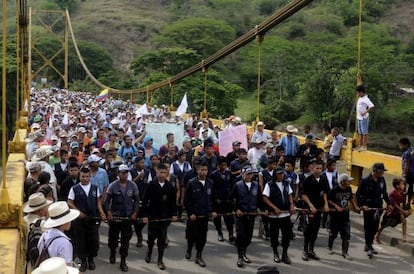Santos unable to contain a new strike in Colombia
Farmers, miners, teachers and health workers mobilize for fresh protests

Colombian President Juan Manuel Santos is facing a new nationwide strike. And this time, several aggrieved groups are coming together: truck drivers are angry over fuel prices, coffee growers are upset at the government’s broken promises of economic relief, and small-scale miners are unhappy about a decree authorizing the government to seize equipment used at illegal outfits — all of which has led agricultural leaders and unions to call a march on the country’s main roads beginning on Monday. Cocoa growers, rice growers, teachers and health workers have already announced that they will be joining the protest.
Colombia’s main union, Central Unitaria de Trabajadores (CUT), said in a press release that this strike is being held in “condemnation of the situation in which the government of Juan Manuel Santos has left the country as a result of his pernicious, anti-unionist and anti-populace policies.”
Santos says that he will not bow to pressure and sent protesters the message that the state has no money left for all the demands made by the sectors involved in the strike.
Some of the opposition – both to the left and right of the government — has come out in defense of the protest in recent hours, such as Polo Democrático and Uribism, the movement around former President Álvaro Uribe. Government spokespeople are calling it political opportunism; some reports claim that the FARC guerrilla group might be forcing peasants in some districts to come out and protest against the executive. The Colombian government is currently engaged in peace talks with the FARC in Havana.
Protests and road blocks have been the weak spot of the Santos administration over the last year. A survey conducted by several media outlets showed that 53 percent of Colombians feel the president has mishandled the social protests, compared with 35 percent who believe he has reacted appropriately.
Last March, thousands of small and medium-sized coffee growers blocked the main roads of the country’s coffee-growing departments for 12 days, causing a major disruption in fuel and food delivery. After two failed attempts at negotiations, Santos managed to get the blockade lifted after pledging to raise subsidies for the sector. But growers continue to make demands.
Last March, thousands of small and medium-sized coffee growers blocked main roads for 12 days
The Colombian leader spent part of his time last week uselessly trying to convince protesters — chiefly the coffee growers of Dignidad Cafetera — to desist from joining a national strike that was announced over a month ago. The protest is expected to bring traffic on major thoroughfares to a standstill and shut down parts of the economy.
Santos and several other government officials have taken a hard stance, reminding would-be strikers that there are laws allowing for the arrest and prosecution of individuals who block communication arteries. Interior Minister Fernando Carrillo noted that anyone using “illicit” means to obstruct roads could face prison terms of two to four years.
Last Saturday, Santos insisted that while he respects the right to social protest, he will not yield to violence. “Go out and protest, but be careful that you don’t create violence, because we will have to be ruthless and prosecute those who break the rules, capture them and judge them.” Santos has assigned 16,000 police officers to crowd control duty and instructed them to prevent road blocks in 19 cities and at least 16 main arteries.
The stoppage comes two weeks after the government managed to partly quell another social protest in Catatumbo, an area bordering with Venezuela where thousands of coca-leaf growers shut down traffic on all major thoroughfares for 50 days while they demanded better economic and social conditions for the region. After numerous negotiations, Santos managed to get the roads open again, but talks are still underway.
Meanwhile, small-scale miners are in the middle of their own talks with the government, with no results to show for it after an entire month at the negotiating table. Their livelihood is affected by government measures aimed at stopping armed groups and criminal gangs from financing themselves through illegal mining activities.
To top things off, activists from the National Student Movement (MANE) announced that they will be taking the streets of Colombia’s main cities on August 28 and 29 to protest the government’s failure to keep its promises following the student protest of December 2011.
Tu suscripción se está usando en otro dispositivo
¿Quieres añadir otro usuario a tu suscripción?
Si continúas leyendo en este dispositivo, no se podrá leer en el otro.
FlechaTu suscripción se está usando en otro dispositivo y solo puedes acceder a EL PAÍS desde un dispositivo a la vez.
Si quieres compartir tu cuenta, cambia tu suscripción a la modalidad Premium, así podrás añadir otro usuario. Cada uno accederá con su propia cuenta de email, lo que os permitirá personalizar vuestra experiencia en EL PAÍS.
¿Tienes una suscripción de empresa? Accede aquí para contratar más cuentas.
En el caso de no saber quién está usando tu cuenta, te recomendamos cambiar tu contraseña aquí.
Si decides continuar compartiendo tu cuenta, este mensaje se mostrará en tu dispositivo y en el de la otra persona que está usando tu cuenta de forma indefinida, afectando a tu experiencia de lectura. Puedes consultar aquí los términos y condiciones de la suscripción digital.








































